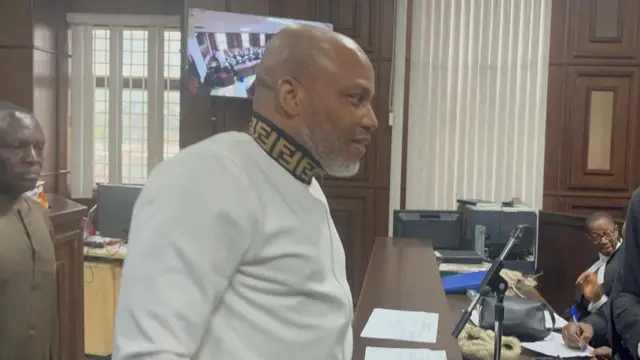In an ongoing terrorism case against Mazi Nnamdi Kanu, leader of the proscribed Indigenous People of Biafra (IPOB), the Federal High Court in Abuja has admitted video evidence of Kanu’s broadcasts on Radio Biafra. The videos, played in open court, were presented by the Federal Government through a Department of State Services (DSS) operative, identified as PW-BBB.
The videos, which include several inflammatory statements, depict Kanu announcing the formation of the Eastern Security Network (ESN), a group that he described as the armed wing of IPOB. In one broadcast, Kanu declared a lockdown across the South-East region, as part of his secessionist agenda for Biafra. The court heard Kanu warning against the presence of Fulani herdsmen in the area and urging his followers to defend their land from what he termed “Fulani domination.”
The prosecution, led by Adegboyega Awomolo, SAN, argued that Kanu’s broadcasts fueled acts of terrorism in the South-East, including coordinated attacks on police stations and correctional facilities. Despite objections from Kanu’s legal team, the court accepted the videos as evidence and marked them as Exhibits PWA and PW1. Additionally, the court also accepted a letter from former Attorney-General Abubakar Malami, dated June 17, 2021, directing the DSS to investigate Kanu for terrorism, murder, and incitement to violence.
The videos shown in court included Kanu’s speeches from December 2020, where he called for resistance against what he described as “Fulani domination,” and from May 2021, in which he ordered a lockdown to commemorate fallen Biafrans. Other clips displayed Kanu urging his followers to acquire arms for self-defence, citing threats from Boko Haram and Fulani herders.
The court also viewed footage from the # Endsars protests, where Kanu allegedly directed attacks on security and government facilities. Furthermore, the official gazette that proscribed IPOB as a terrorist organisation in 2017 was admitted as evidence.
The trial resumed with this new evidence and has seen various legal challenges. Kanu was arrested in 2015 and granted bail in 2017, but later fled the country, only to be re-arrested in Kenya and brought back to Nigeria in 2021. His trial has seen numerous legal battles, including a 2022 ruling that struck out several charges against him. However, following appeals, the Supreme Court ruled in December 2023 that Kanu should face trial on the remaining charges.
The court adjourned the case for further proceedings, with the next session scheduled today.

